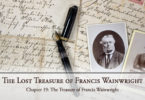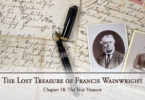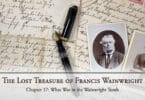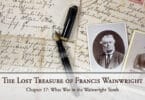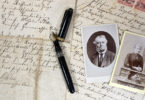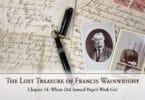Samuel Pope, the cousins quickly discovered with a simple Google search, was a blacksmith from Salem, around the same time Francis was living in Ipswich. Samuel was also a Quaker. Grace pointed out how strange it was for a Puritan like Francis to hire a Quaker, even during a time of greater Quaker toleration by the Puritans. Once the Quaker persecutions ended, thanks to royal intervention from England, the Puritans in the colonies were still not eager to associate with those whom they considered heretics. Samuel Pope must have really known what he was doing.
And, further research on Google revealed Samuel did know what he was doing. In fact, he was a sought after expert in the Essex County area and up into New Hampshire during his day. He was the one with whom all the other top blacksmiths of the area served their apprenticeships. Generations of Massachusetts and New Hampshire blacksmiths could trace their knowledge of the craft back to a father, grandfather, or great-grandfather who apprenticed with Samuel Pope.
“He was so impressive,” Grace said, looking at the computer screen in awe.
“No wonder Francis was willing to cross religious lines and pay him so much money,” James agreed.
“We’re going to have to go to Salem to find any commerce records he left,” Christine said. “There wasn’t anything online beyond basic genealogy information. I checked on my phone while the rest of you were looking up Samuel’s actual identity.”
“The Salem town hall?” Emily suggested. “That is where those types of records are usually kept. And the records go back pretty far in time.”
“Or, the Peabody-Essex Museum,” Christine mentioned. “They have an insane amount of records going back to the 1600s. All of the Salem witchcraft trial transcripts are kept there.”
“Why don’t we try the museum first,” James decided, “and, then go to the town hall if there isn’t anything at the museum.”
“Sounds good to me,” Adam said, nodding.
The rest of the cousins also nodded their consent to this plan. The next thing they knew, they were all in Christine’s car, headed for Salem. Since Essex County is a relatively small county, as far as counties go, they were able to arrive at the modern-looking and attractive Peabody-Essex museum from Christine’s house in about half an hour. All five cousins jumped out of the car almost before it was in park, so eager were they to get inside the building.
After a brief consultation with one of the museum docents, they were brought to a research room containing tens of thousands of pages of ancient documents. It looked like it would take years to find what they needed, but somehow, the docent was able to pull out what they needed without even thinking about it.
“Here you go,” the older woman said, smiling. She handed them a thick manila folder full of ancient papers. Some of them were in plastic sheet protectors, while others were open to be touched. Samuel Pope did a lot of business in his heyday.
The docent indicated a large table where they could all sit. “Let me know if you need anything else,” she said cheerily as she left them alone in the room. “And when you’re done, just leave the folder on the table.”
It was obviously going to take a long time to find what they needed. That much was clear from their first glance at what the folder contained. Every sheet of linen or hemp paper was handwritten, usually in tiny, archaic script, and not always in straight lines; there were plenty of scratch-outs, and corrections, too, as well as notes in the margins, and even between the lines, on many of the pages.
They might be there all day. Heck, they might have to come back a few days in a row to find what they needed.
It was one o’clock in the afternoon when the cousins arrived at the Peabody-Essex Museum; it was fifteen minutes to closing time at five o’clock when Emily found it.
“Here it is!” Emily exclaimed with excitement. She jumped up and pointed at the page.
“What is it?” Grace asked. All of the cousins came to her side of the table and gathered around her, eager to discover a solution to the mystery.
“Look,” Emily said, paraphrasing the paper to them as she read it. “It says here that Francis Wainwright commissioned Samuel Pope to put a megalith of a memorial plate dedicated to Philippa on the Wainwright family tomb in Ipswich. He also paid Samuel to build an iron statue of Philippa to go in front of the tomb; it was to be twice her size in life, so no one would miss it, and to be modeled on her miniature portrait, along with an extra description that Francis provided of her in a letter to Samuel. It cost a king’s ransom. Francis spared no expense to make sure no one forgot his first wife and only true love. The statue was to represent Philippa as she was in her youth when they got married, as Francis always thought of her. That’s so sweet.”
“Yeah, that is sweet, for sure,” Adam agreed. “But, where is the plate and statue? We’ve all been to the ancient cemetery in Ipswich with Grandma. We’ve all seen the Wainwright family tomb. It’s impressive compared to most of the others, but there are a few other ones there like it, and there is certainly no plate and statue on it.”
“True,” James said. “You wouldn’t miss something like that. And none of us have ever seen it. Did Samuel not build it? Was the project too big?”
“No,” Emily assured him. “It says right here that Samuel accepted the money. Francis’s account was paid in full, and there was no refund. He did the work. The question is, where is the result? Where is the finished product?”

